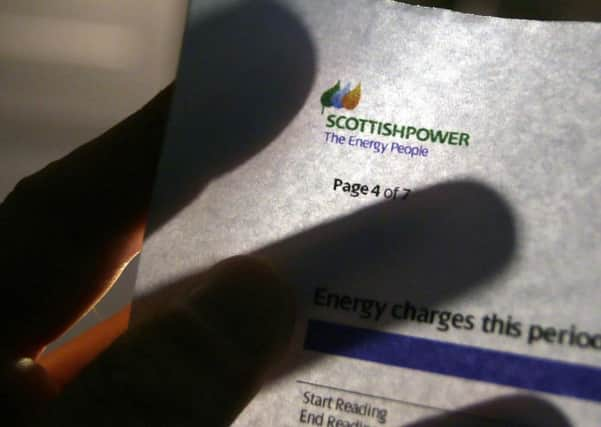Scots urged to switch power firms after paltry price cuts


Energy market experts are urging customers on tariffs with the so-called “big six” to consider switching to smaller challengers offering an alternative to the status quo.
The calls come in the wake of research showing that more than a third of homes in Scotland are classed as living in fuel poverty.
Advertisement
Hide AdAdvertisement
Hide AdAll of the big six energy suppliers – British Gas, Scottish Power, Scottish & Southern Energy (SSE), EDF, Eon and Npower – have now announced gas price cuts that will kick in over the coming weeks. The latest announcements were from British Gas (Scottish Gas north of the Border), with a 5.1 reduction from 16 March – reducing costs for 6.8 million homes on dual fuel deals – and EDF, with a 5 per cent cut taking effect eight days later.
The changes have been dismissed as being too little, too late, however.
Ben Wilson, energy spokesperson at Gocompare.com, said: “Both companies have waited so long that it will be spring before their loyal customers feel any benefit. By then, customers will be turning the heating down but will have already paid well over the odds for their big winter energy bills.”
Similar gas price reductions from Scottish Power and SSE take effect on 15 and 29 March respectively. But the latest changes are only on “very expensive tariffs that are best avoided”, said Mark Todd, co-founder of Energyhelpline. Suppliers are still failing to cut electricity tariffs despite 35 per cent falls in wholesale electricity prices, he added.
UK wholesale gas and electricity prices were at a five-year low by the end of 2015, according to analysis by information provider CIS. The failure of the big six to pass on wholesale savings to customers leaves the onus on households to take action by reducing energy usage or switching tariff.
Households can save almost £300 a year by switching provider, according to energy regulator Ofgem. Some of the best deals are now offered by small suppliers that now account for nearly 15 per cent of the household energy market, up from 2.6 per cent just two years ago. The eight cheapest dual fuel tariffs are all offered by market minnows such as GB Energy Supply, First:Utility, Avo Energy and Flow Energy, Gocompare’s tables show. All have fixed tariffs of between £765 and £775, based on average usage and monthly direct debit payments.
There are now more than 30 small energy suppliers in the UK, with their emergence perhaps the most positive change in the energy market in recent years.
“These small suppliers are advantaged as they don’t need to pay green stealth taxes at first,” said Mark Todd at Energyhelpline.
Advertisement
Hide AdAdvertisement
Hide Ad“The small suppliers are taking around 1.5 million homes a year off the big six across the UK, often undercutting them on price massively. Around four million homes have now left the big six, seeking out savings averaging £300 a year over the last few years.”
The introduction of “cheaper tariff messaging” – where suppliers must mention if asked by a customer what their cheapest tariffs are – has also shown signs of improving matters for households.
“The impact was at first that the big suppliers pulled many of their cheaper deals for new sign-ups as they were so worried about cannibalising their profitable base,” said Todd. “This is now starting to change though and some big suppliers are now beginning to offer cut- price tariffs again.”
But seven in ten households are still on expensive standard tariffs with the big six, rising to around 90 per cent of Scottish & Southern Energy (SSE) customers.
Ending the use of standard tariffs is among the proposals being considered by the Competition and Markets Authority (CMA), which last year concluded after an investigation into the sector that households are paying over the odds for their energy supply.
Households would instead have to actively choose a new tariff each year. However, the proposal would simply give energy firms “regulatory licence to rip off their customers”, Citizens Advice warned in a response to the CMA consultation.
As the CMA puts the final touches to its report, the Scottish Government is under fire for cutting spending on fuel poverty and energy efficiency initiatives from £119m in 2015-16 to £103m in 2016-17.
More than half of households in parts of Scotland are living in fuel poverty (defined as spending more than 10 per cent of their household income on fuel use), according to the most recent Scottish house condition survey.
Advertisement
Hide AdAdvertisement
Hide AdThe survey, covering 2012 to 2014, found that 63 per cent of households in the Orkney Islands are in fuel poverty. The Highlands (55 per cent) and the Shetland Islands (53 per cent) are close behind. The Scottish average is 35 per cent, with the lowest levels of fuel poverty in Edinburgh (25 per cent), Falkirk, East Dunbartonshire (both 28 per cent), West Lothian and Aberdeen City (29 per cent).